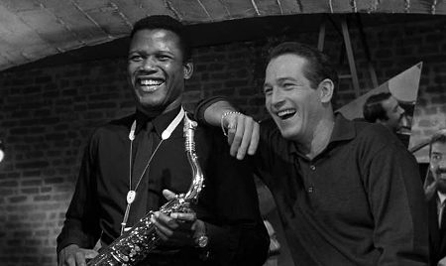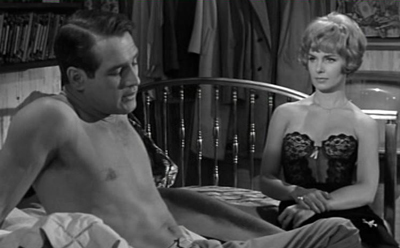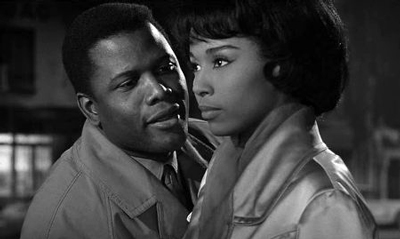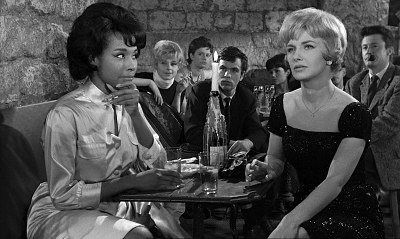Reviewed by Glenn Erickson
Married stars Paul Newman and Joanne Woodward periodically did their best to break free of the sameness of Hollywood filmmaking. 1961 was a big year for Paul, after several seasons paying dues in melodramas and comedies for Fox, and a starring role in Otto Preminger's somewhat bloated Exodus. He drew major critical attention in Robert Rosson's The Hustler, while the independently produced Paris Blues took Newman and Woodward to France for a dream project. Hollywood had been having little or no luck connecting with the new generation of beats, jazz fanatics and societal drop-outs, as evidenced in MGM's nearly unwatchable The Subterraneans. With the socially committed Martin Ritt as director, Paris Blues also touches base with racial attitudes while trying to create a convincing Parisian atmosphere. With its clean-cut jazz artistes and simple romantic situations, the film looks fairly square beside the then-new semi-documentary film experiments. But by Hollywood standards it's both honest and daring. And it can boast an excellent music score by Duke Ellington.

American jazz musicians Ram Bowen (Paul Newman) and Eddie Cook (Sidney Poitier) are a hot attraction at the Left Bank nightclub of Marie Seoul (Barbara Laage). Ram sleeps with Marie while dreaming of becoming as big a star as the visiting talent Wild Man Moore (Louis Armstrong). Eddie just likes to work in a country with less race prejudice than the U.S.. They meet and date American tourists Lillian Corning and Connie Lampson (Joanne Woodward & Diahann Carroll), who are in town for only two weeks. Lillian overcomes Ram's rudeness and is almost immediately his lover, while Connie stays standoffish. She entreats Eddie to come back to America, to face reality instead of running away. Ram takes a meeting with the hope of finding a sponsor for the concerto he's written. He also does his best to help Michel Duvigne aka The Gypsy (Serge Reggiani), a fellow musician with a bad drug habit.
In 1961 the prospect of a fantasy date on the banks of the Seine with Paul Newman or Sidney Poitier was more than enough to entice female patrons into theaters. Nobody would worry that Paris Blues plays like an ersatz French film, where everyone speaks English and even a trombonist's sloppy garret apartment is neat and tidy. The film's best material simply shows Sidney Poitier and Diahann Carroll's characters out for a 2am stroll, looking over their shoulders at Notre Dame. In 1961 it was news to have a black romantic couple in an American movie at all, let alone behaving in such a casual manner.

Then "acting" gets in the way. Newman and Woodward approach their characters as if on a stage, and the initial feeling of relaxed freedom is lost. Ram Bowen's boorish behavior seems forced, while Lillian Corning's sexually aggressive manner makes us feel that she's on a rush schedule to bend Ram to her will. The trombone virtuoso wants to become George Gershwin, it seems. Ram's bohemian cred evaporates after we see him kowtow to the big time music sponsor, behaving like a button-downed undergraduate.
As much as we like Sidney Poitier he never seems loose enough to play jazz, let alone personify a carefree drifter. His Eddie looks and dresses like an employee of I.B.M.. As soon as Ms. Carroll's Connie starts feeding him Civil Rights lectures to come back to fight the Good Fight in America, we know that Eddie will be towing the line in short order. It's too bad that we don't get a chance to hear Diahann Carroll sing; she performed in the same year's Goodbye Again for Anatole Litvak.

Pro musicians of course play for the stars, and Duke Ellington's distinctive music provides more than enough atmosphere to keep the jazz theme afloat. We hear "Take the A Train" and "Mood Indigo" and the main Paris Blues Theme has a catchy feel. It is apparently the basis for Ram Bowen's jazz concerto.
Like everything else in the movie, genuine jazz great Louis Armstrong has apparently been chosen with an eye on the box office. The first man up whenever a Hollywood movie needs jazz, Armstrong appeared in The Glenn Miller Story, High Society and most had most recently guest-starred for Danny Kaye in The Five Pennies. Paris in 1961 was crawling with progressive jazz talents of all kinds and their music showed up with some frequency in French films. Paris Blues takes us to exotic Paris just to give us what we're already familiar with.
Singer-turned actor Serge Reggiani appears to be playing a mean gypsy guitar in one scene, and his air of authenticity gives the film's atmosphere a needed boost. Even when speaking English Reggiani is an interesting presence; the picture to see him in is Jean-Pierre Melville's thriller Le doulos. The filmmakers may have thought that his subplot as a drug abuser would be controversial, but it also plays as rather tame.

The movie makes great use of Parisian locations, but most dialogue scenes are filmed on sets built in a French studio. Alexandre Trauner's detailed streets show the same use of forced perspective seen two years later in Billy Wilder's Irma La Douce. Photo blowup backdrops are very cleverly matched in for dialogue close-ups filmed on stage, even when Poitier and Carroll are standing on a bridge over the Seine. Just the same it seems counterproductive to go all the way to Paris and then do what is mainly a studio shoot. We never believe we're in a real artist's garret at rooftop level, although American audiences in 1961 likely did not notice -- the semi-docu look hadn't yet been seen much, at least not for movies with glamorous stars.
Everything in Paris Blues wraps up neatly, even a sad parting or two. Director Ritt and his top talent do their best, but the Hollywood system still seems to dominate this entertaining piece of Paris escapism. Interestingly, producer Sam Shaw would eventually help produce four of John Cassavetes' '70s movies, slice-of-life acting showcases that take the exact opposite approach of Paris Blues.

The KL Studio Classics Blu-ray of Paris Blues presents this United Artists show in fine condition. The HD transfer brings out the textures of Christian Matras' B&W cinematography, and the strong mono audio turns Ellington's score into a concert. The original soundtrack to this picture was a big seller.
An original trailer is included, and the disc is also available in a DVD edition.
On a scale of Excellent, Good, Fair, and Poor,
Paris Blues Blu-ray rates:
Movie: Good
Video: Excellent
Sound: Excellent
Supplements: original trailer
Deaf and Hearing Impaired Friendly?
YES; Subtitles: English
Packaging: Keep case
Reviewed: July 24, 2014

Text © Copyright 2014 Glenn Erickson
See more exclusive reviews on the Savant Main Page.
Reviews on the Savant main site have additional credits information and are often updated and annotated with reader input and graphics.
T'was Ever Thus.
Return to Top of Page
|

